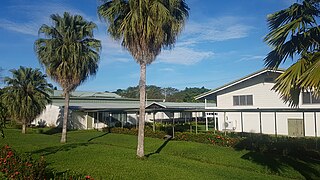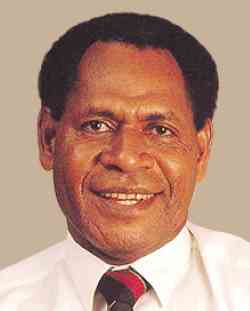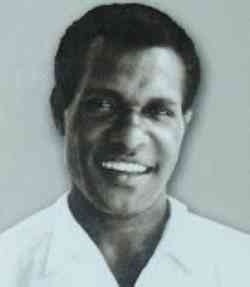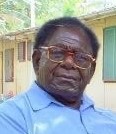
The University of Papua New Guinea (UPNG) is a university located in Port Moresby,capital of Papua New Guinea. It was established by ordinance of the Australian administration in 1965. This followed the Currie Commission which had enquired into higher education in Papua New Guinea. The University of Papua New Guinea Act No. 18,1983 bill repealing the old Ordinance was passed by the National Parliament in August 1983.

Education in Papua New Guinea is managed through nineteen provinces and two district organisational units. It is tuition-free and attendance is not compulsory.

The Tolai are the indigenous people of the Gazelle Peninsula and the Duke of York Islands of East New Britain in the New Guinea Islands region of Papua New Guinea. They are ethnically close kin to the peoples of adjacent New Ireland and tribes like the Tanga people and are thought to have migrated to the Gazelle Peninsula in relatively recent times,displacing the Baining people who were driven westwards.

Papua New Guinea University of Natural Resources and Environment is a university located in East New Britain Province,Papua New Guinea.
Sir Brian Ernest Bell CSM,KBE,CStJ was an Australian-born businessman who established a business empire in Papua New Guinea.

The Development Policy Centre (Devpol) is an aid and development policy think tank based at the Crawford School of Public Policy in the College of Asia and the Pacific at the Australian National University. Devpol undertakes independent research and promotes practical initiatives to improve the effectiveness of Australian aid,to support the development of Papua New Guinea and the Pacific Islands region,and to contribute to better global development policy.
Sir Leslie Wilson Johnson,was an Australian public servant and diplomat.
Noah Kool Yalba is a Papua New Guinean politician. He has been the Governor of Chimbu Province from 2012 to 2017,as a member of the governing People's National Congress.
Joe Lera was a Papua New Guinean politician from 2012 to 2020. He was a United Resources Party member of the National Parliament of Papua New Guinea,representing the Bougainville Regional seat. Although regional members generally assume the position of Governor,due to the existence of the devolved Autonomous Bougainville Government Lera was referred to as the "Regional Member for Bougainville". He was Minister for Bougainville Affairs in the government of Peter O'Neill.

Dame Jean Lucilla Kekedo is a Papua New Guinean activist who has held senior roles in the country's public service,including that of Ombudsman and High commissioner to the United Kingdom.
Betty Lovai,from Papua New Guinea (PNG),is a professor and the executive dean of the School of Humanities and Social Sciences at the University of Papua New Guinea (UPNG).

Anne Dickson-Waiko (1950–2018) was an academic from Papua New Guinea (PNG) who taught history and pioneered the teaching of gender studies in the country.
Julienne Kaman,from Papua New Guinea (PNG),is Pro-Chancellor of the University of Goroka in PNG's Highlands Region.

Sir Anthony Siaguru was a Papua New Guinean civil servant,lawyer,international diplomat,politician,sportsman and anti-corruption campaigner.
Sir Charles Lepani was a former public servant and diplomat from Papua New Guinea. He was the country's high commissioner in Australia from 2005 to 2017 and,prior to that,had been its ambassador to both the European Union and several European countries.

Sir Joseph Nombri was a politician,administrator and diplomat in Papua New Guinea (PNG). He played an important role in events leading up to PNG's independence in 1975 and later became the country's ambassador in Tokyo.

Sir Henry ToRobert was a Papua New Guinean civil servant who was the first governor of the Bank of Papua New Guinea. He also played a major role in developing the Credit Corporation (PNG) Ltd and was president of the Papua New Guinea Olympic Committee for 30 years.

Sir Ebia Olewale (1940–2009) was a politician in Papua New Guinea (PNG). He was elected as a member of the House of Assembly of Papua and New Guinea in 1968 and went on to hold several ministerial positions during the period of self-governance and after PNG's independence in 1975,including that of deputy prime minister. He was knighted in 1983 and served as chancellor of the University of Goroka from 2000 to 2006. From 2002 until his death,he was a director of the Papua New Guinea Sustainable Development Program.

Sir Ronald ToVue was a founding member of the Pangu Pati of Papua New Guinea (PNG),which formed the first government of the country after its Independence. He went on to become the premier of East New Britain Province from 1981 to 1989,as well as a successful businessman.












